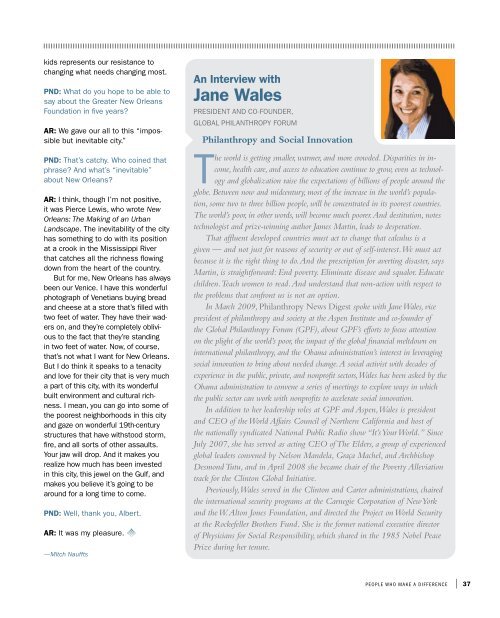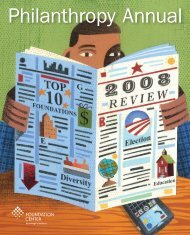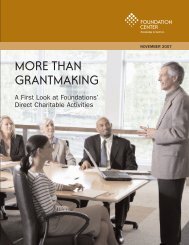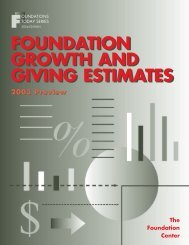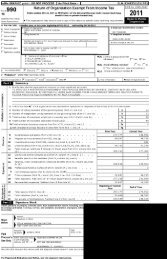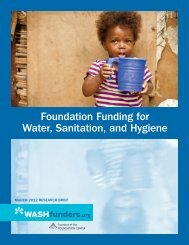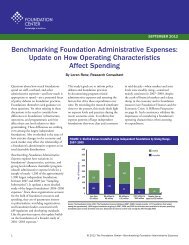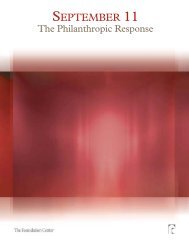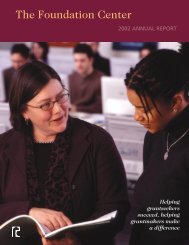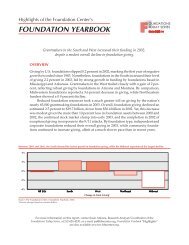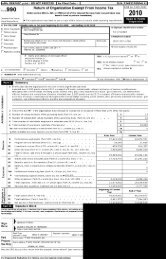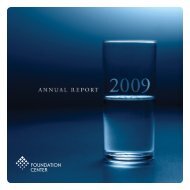Download Philanthropy Annual PDF - Foundation Center
Download Philanthropy Annual PDF - Foundation Center
Download Philanthropy Annual PDF - Foundation Center
You also want an ePaper? Increase the reach of your titles
YUMPU automatically turns print PDFs into web optimized ePapers that Google loves.
kids represents our resistance to<br />
changing what needs changing most.<br />
PND: What do you hope to be able to<br />
say about the Greater New Orleans<br />
<strong>Foundation</strong> in five years?<br />
AR: We gave our all to this “impossible<br />
but inevitable city.”<br />
PND: That’s catchy. Who coined that<br />
phrase? And what’s “inevitable”<br />
about New Orleans?<br />
AR: I think, though I’m not positive,<br />
it was Pierce Lewis, who wrote New<br />
Orleans: The Making of an Urban<br />
Landscape. The inevitability of the city<br />
has something to do with its position<br />
at a crook in the Mississippi River<br />
that catches all the richness flowing<br />
down from the heart of the country.<br />
But for me, New Orleans has always<br />
been our Venice. I have this wonderful<br />
photograph of Venetians buying bread<br />
and cheese at a store that’s filled with<br />
two feet of water. They have their waders<br />
on, and they’re completely oblivious<br />
to the fact that they’re standing<br />
in two feet of water. Now, of course,<br />
that’s not what I want for New Orleans.<br />
But I do think it speaks to a tenacity<br />
and love for their city that is very much<br />
a part of this city, with its wonderful<br />
built environment and cultural richness.<br />
I mean, you can go into some of<br />
the poorest neighborhoods in this city<br />
and gaze on wonderful 19th-century<br />
structures that have withstood storm,<br />
fire, and all sorts of other assaults.<br />
Your jaw will drop. And it makes you<br />
realize how much has been invested<br />
in this city, this jewel on the Gulf, and<br />
makes you believe it’s going to be<br />
around for a long time to come.<br />
PND: Well, thank you, Albert.<br />
AR: It was my pleasure.<br />
—Mitch Nauffts<br />
An Interview with<br />
Jane Wales<br />
President and Co-Founder,<br />
Global <strong>Philanthropy</strong> Forum<br />
<strong>Philanthropy</strong> and Social Innovation<br />
The world is getting smaller, warmer, and more crowded. Disparities in income,<br />
health care, and access to education continue to grow, even as technology<br />
and globalization raise the expectations of billions of people around the<br />
globe. Between now and midcentury, most of the increase in the world’s population,<br />
some two to three billion people, will be concentrated in its poorest countries.<br />
The world’s poor, in other words, will become much poorer. And destitution, notes<br />
technologist and prize-winning author James Martin, leads to desperation.<br />
That affluent developed countries must act to change that calculus is a<br />
given — and not just for reasons of security or out of self-interest. We must act<br />
because it is the right thing to do. And the prescription for averting disaster, says<br />
Martin, is straightforward: End poverty. Eliminate disease and squalor. Educate<br />
children. Teach women to read. And understand that non-action with respect to<br />
the problems that confront us is not an option.<br />
In March 2009, <strong>Philanthropy</strong> News Digest spoke with Jane Wales, vice<br />
president of philanthropy and society at the Aspen Institute and co-founder of<br />
the Global <strong>Philanthropy</strong> Forum (GPF), about GPF’s efforts to focus attention<br />
on the plight of the world’s poor, the impact of the global financial meltdown on<br />
international philanthropy, and the Obama administration’s interest in leveraging<br />
social innovation to bring about needed change. A social activist with decades of<br />
experience in the public, private, and nonprofit sectors, Wales has been asked by the<br />
Obama administration to convene a series of meetings to explore ways in which<br />
the public sector can work with nonprofits to accelerate social innovation.<br />
In addition to her leadership roles at GPF and Aspen, Wales is president<br />
and CEO of the World Affairs Council of Northern California and host of<br />
the nationally syndicated National Public Radio show “It’s Your World.” Since<br />
July 2007, she has served as acting CEO of The Elders, a group of experienced<br />
global leaders convened by Nelson Mandela, Graça Machel, and Archbishop<br />
Desmond Tutu, and in April 2008 she became chair of the Poverty Alleviation<br />
track for the Clinton Global Initiative.<br />
Previously, Wales served in the Clinton and Carter administrations, chaired<br />
the international security programs at the Carnegie Corporation of New York<br />
and the W. Alton Jones <strong>Foundation</strong>, and directed the Project on World Security<br />
at the Rockefeller Brothers Fund. She is the former national executive director<br />
of Physicians for Social Responsibility, which shared in the 1985 Nobel Peace<br />
Prize during her tenure.<br />
People Who Make a Difference | 37


